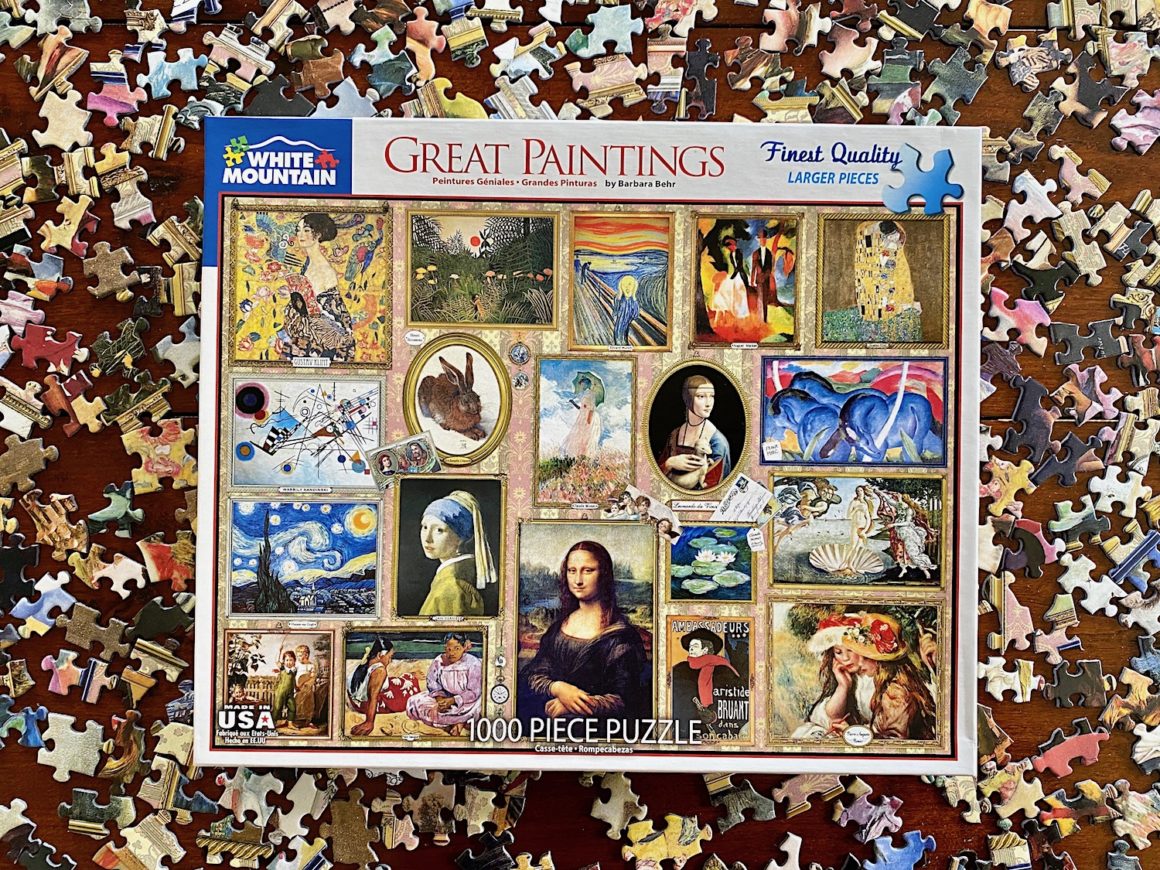The Art Market Puzzle of 2020
 Making this puzzle come together
Making this puzzle come together
At first, I’m a bit overwhelmed staring at 1,000 pieces of this big jigsaw puzzle. They must be reassembled into 19 great paintings, by masters ranging from da Vinci to Kandinsky. The magnitude of the challenge found me daydreaming: What if all those pieces represented museums and galleries in the current dysfunctional art market? How long will a concerted effort take before we recognize recovery? By the end of 2020, what will the gallery map look like? By the end of 2021, how many pieces of that puzzle will look very different — or be missing?
I’ve been through six recessions but this one presents greater challenges than the OPEC oil embargo of 1973–75, or the crushing interest rates of 1982–83, or the savings & loan crisis of 1990–91, or the dot.com bust of 2001, or the sub-prime mortgage crisis of 2008–09. Now we’re immersed in one that nobody foresaw: the veritable “black swan event” that is the covid-19 pandemic. I’m no crystal-ball prognosticator, but I do have confidence in the dictum ars longa — art lives forever. That was proven throughout those decades of rising and falling tides. Lives impacted by fine art continued to seek it, enjoy it, and own it. So, I just kept publishing art reference tools, parallel with pursuing the unusual mission of bringing critical recognition to those artists who, despite their innovation, never achieved lasting recognition.
Now, it’s no surprise that the present crisis would spur the art market media to focus on examples of how the coronavirus pandemic is adversely impacting galleries, museums, and art fairs. You can be sure that stories about how artists have dealt with the repercussions will lag by a year. The biggest deciding factors are the fates of those players driving the marketing machine (museums and galleries). All have by now realized the need to evolve at a quicker pace out of dire necessity. Already, they are adopting new strategies to promote their exhibitions and sell art. That’s why so many journalists predict that a permanent reconstruction of the art market is not only inevitable but well underway. Virtual exhibitions in 3D space will be increasingly adopted. Long-standing relationships with collectors will continue via Zoom. Eventually, rolling openings for exhibitions will assign people to viewing time slots based on confirmed RSVPs — maybe over a few evenings. After all, openings were the only time galleries were ever crowded
If you really want to keep your finger on the pulse of the art market, rule No.1 is that it has always been driven by an innately highly sensitive psychology. That’s why my first bit of practical advice is to observe the “Artmarket Confidence Index” (AMCI) produced daily by the Artprice Econometrics team. This is essentially an “anticipation index” that has proven an excellent barometer of the art market since 2008. This index is valid because it is a direct reflection of thousands of market participants whose opinions are recorded throughout each day. Anyone can participate, citing their reactions to not only high-profile auctions, but to current news regarding the stock market and geopolitical events. The AMCI starts at a reference point of zero. Positive values reflect optimism while values below 0 show pessimism. Artprice is the big gorilla in art market information. It produces many indices based on its documentation of auction price results for every artist sold at auction worldwide — now nearly three-quarter million artists. One section of its 2019 Art Market Report includes total dollar turnover at auction for the “Top 500” artists. Here’s some perspective: Those 500 — the most actively-traded artists — account for less than 1/10th of 1% of the total number of artists documented on Artprice! Even the artists ranking near the bottom of those 500 show annual turnovers of about $3 million. For example, the American painters Robert Mangold [b.1930] and Frank Bowling [b.1936] are in that range.
After the big May auctions in 2019 the AMCI barometer was +45. But now, in mid-April 2020, it has flipped 180° to about -32. The barometer saw market respondents acknowledging that even though the overall financial situation was continuing to decline it was nevertheless a good time to purchase art. They feel that buying during this negative period denotes a positive value proposition — so long as one can recognize quality. The most recent opinions flowing into this timely index is that a plateau has been reached, in parallel with the plateau of infections now reported in many major cities. This is, in part, why we feel there is validity to the adage that we can see light at the end of the tunnel.Another very useful series by Artprice is its twice-monthly ArtMarketInsights. On March 19th it noted that “The major auction houses have plenty of experience with online sales and are perfectly equipped to switch their prestige sales into the digital sphere.”
I’m done with my tips.
I took a break to return to the 100-piece puzzle. It includes Edvard Munch’s The Scream of 1883. It’s certainly becoming a principal emblem of these times of existential anxiety. But there’s some comfort in knowing that Munch’s vivid blood orange skies were most likely the result of the devastating eruption of the Krakatoa volcano 9,000 miles away, which filled the earth’s jet streams with airborne ash particles. Munch wrote that in those red skies, “I sensed an infinite screaming passing through nature.”
With patience and persistence, together we will reassemble this puzzle without screaming.
— Peter Hastings Falk

